

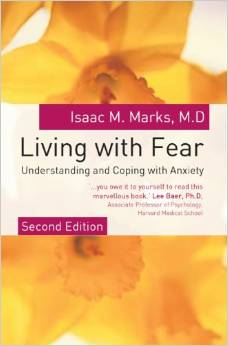
Living With Fear
Living with Fear is a self-help book that gives practical advice to people who are suffering from phobias, panic, obsessions, rituals or traumatic distress.
In the new edition, the author has updated the book to include new phobias e.g. fear of Aids contamination as well as the latest treatments. References, examples and case studies will be updated throughout the book. The case examples in the current edition are drawn from many parts of the world.
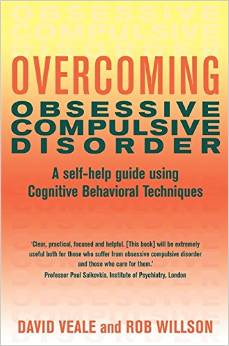
Overcoming Obsessive Compulsive Disorder
Are you plagued by a recurring thought or idea that just won’t go away, feel the need to wash your hands repeatedly, to hoard things, or to repeatedly check that all appliances in the house have been turned off before you leave? These are just some of the common symptoms of Obsessive Compulsive Disorder (or OCD), a condition that causes distress to hundreds of thousands of people. Cognitive Behaviourial Therapy has been clinically proven to significantly reduce these and other symptoms in the majority of cases. With this step by step approach you can learn how to break free from the destructive cycle of obsessive behaviour and regain control of your life. This book shows you how to reduce the distress caused by disturbing thoughts, images and urges; to face fears and troubling situations; to reduce and gradually overcome compulsions and to offer advice on how partners, relatives and friends can help.
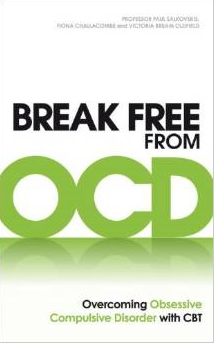
Break Free from OCD
Are you plagued by obsessive thoughts, rituals or routines? Would you like to regain control over your behaviour and cast your fears aside?
Whether you are compelled to wash your hands more and more thoroughly or feel the need to keep checking that you've turned off appliances, obsessive worries can be a drain on daily life. However, you don't need to suffer any more. This practical guide, written by three leading cognitive behavioural therapy experts, enables you to make sense of your symptoms, and gives a simple plan to help you conquer OCD.
Whether your condition is mild or severe, this definitive resource will help you reclaim your life and keep OCD away for good.
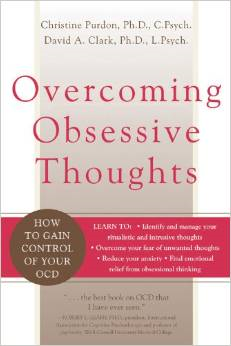
Overcoming Obsessive Thoughts: How to Gain Control of Your OCD
Although once thought to be a rare and unusual condition, obsessive-compulsive disorder (OCD) has become increasingly a part of everyday discourse as it has gathered more and more media attention.
This book addresses the needs of those who struggle with obsessive thoughts they perceive as violent, disgusting, or blasphemous. Psychologists estimate that more than 50 percent of OCD sufferers experience aggressive, religious, or sexual thoughts. The goal of this book is to help people understand the impact of their control efforts on their obsessional thoughts. It works to help them recognize that thoughts, in themselves, are not threatening, dangerous, or harmful. Rather, it is the compulsive strategies they develop for coping that make the thoughts seem so harmful. The book offers safe and effective exposure exercises readers can use to limit the effect obsessive thoughts have on their lives. In addition to self-care strategies, the book includes information about choosing and making the most of professional care.
Overcoming Obsessive Thoughts: How to Gain Control of Your OCD on Amazon UK
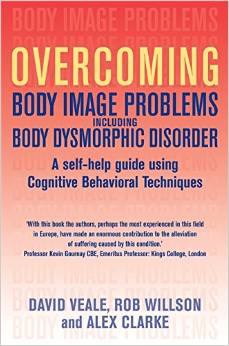
Overcoming Body Image Problems including Body Dysmorphic Disorder
Many people occasionally suffer from a negative body self-image but, for an increasing number of people, this can turn into a more serious preoccupation. One per cent of the population will develop Body Dysmorphic Disorder (BDD), a condition characterised by severe preoccupation with a perceived physical defect. Body image problems can cause significant distress and can lead to further problems such as anxiety, eating disorders and social phobia. It has long been recognised that negative body image problems are a factor in the onset and maintenance of many eating disorders. However, they can be successfully treated with cognitive behavioral therapy (CBT).
Overcoming Body Image Problems including Body Dysmorphic Disorder on Amazon UK
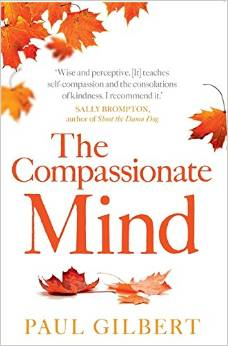
The Compassionate Mind
Throughout history people have sought to cope with a life that is often stressful and hard. We have actually known for some time that developing compassion for oneself and others can help us face up to and win through the hardship and find a sense of inner peace. However in modern societies we rarely focus on this key process that underpins successful coping and happiness and can be quick to dismiss the impact of modern living on our minds and well-being. Instead we concentrate on 'doing, achieving and having'. Now, bestselling author and leading authority on depression, Professor Paul Gilbert explains how new research shows how we can all learn to develop compassion for ourselves and others and derive the benefits of this age-old wisdom. In this ground-breaking new book he explores how our minds have developed to be highly sensitive and quick to react to perceived threats and how this fast-acting threat-response system can be a source of anxiety, depression and aggression. He describes how studies have also shown that developing kindness and compassion for self and others can help in calming down the threat system. Not only does compassion help to soothe distressing emotions, it actually increases feelings of contentment and well-being.
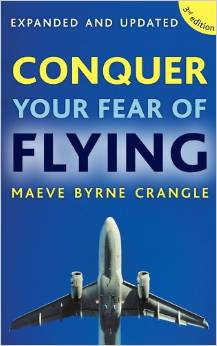
Conquer Your Fear of Flying
Now updated with the latest information on security screening and safety procedures at airports, this well-established book examines the many types of anxiety involved with flying and sets out a workable plan to conquer these apprehensions. It offers a programme of self-management, showing the reader how to use proven stress management techniques to cope with and diffuse anxiety and panic before and during flights. Included in this third edition are sections on the power of the mind and the use of affirmations, as well as flight plans, frequently asked questions and golden rules for fearless flying. Air travel remains statistically safer than crossing the road and flying has proved to be twenty-five times safer than driving your own car. Conquer Your Fear of Flying is the book to convince even the most faint-hearted flyers of these facts, and to help them towards a happy and fearless future with air travel.
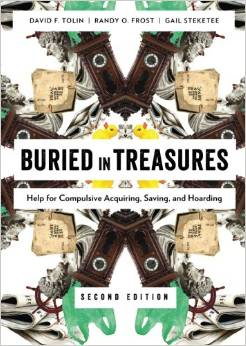
Buried in Treasures: Help for Compulsive Acquiring, Saving, and Hoarding
While most people find it relatively easy to manage their possessions, some find it extremely difficult. If you have a problem resisting the urge to acquire and you find your home cluttered and filled to capacity with items many people would find useless and unnecessary, you may suffer from a condition known as hoarding disorder
This fully updated Second Edition of Buried in Treasures outlines a scientifically based, effective program for helping those with hoarding disorder dig their way out of the clutter and chaos of their homes. Written by scientists and practioners who are leaders in studying and treating hoarding disorder, this book outlines a program of skill-building, learning to think about possessions in a different way, and gradual challenges to help people manage their clutter and their lives. It also provides useful information for family and friends of people who hoard, as they struggle to understand and help.
Buried in Treasures: Help for Compulsive Acquiring, Saving, and Hoarding on Amazon UK
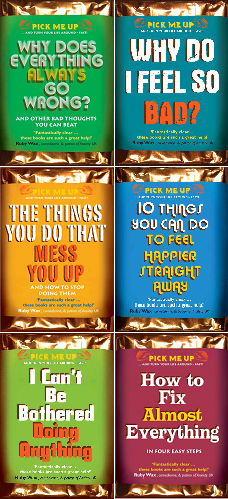
Pick Me Up series (quick reads)
These amazing little books are potential life-savers. Using simple text and bold design, each book meets the reader at a point of low mood or unhelpful thinking, and guides them through rational thought processes to a more positive mood and a healthier outlook on life. Based on CBT, which aims to change patterns of thinking or behaviour that are behind people’s difficulties and so change the way they feel (and currently the subject of major government investment), Pick Me Ups can enable readers to feel happier, to sleep better, to do more and to feel more confident.
Dr Chris Williams is one of the UK’s leading CBT trainers and teachers, and president of the British Association for Behavioural and Cognitive Psychotherapies (BABCP), the lead body for CBT in the United Kingdom. He is Professor of Psychiatry and Honorary Consultant Psychiatrist at the University of Glasgow and patron of the charity Triumph over Phobia, the National Phobics Society and Anxiety UK.